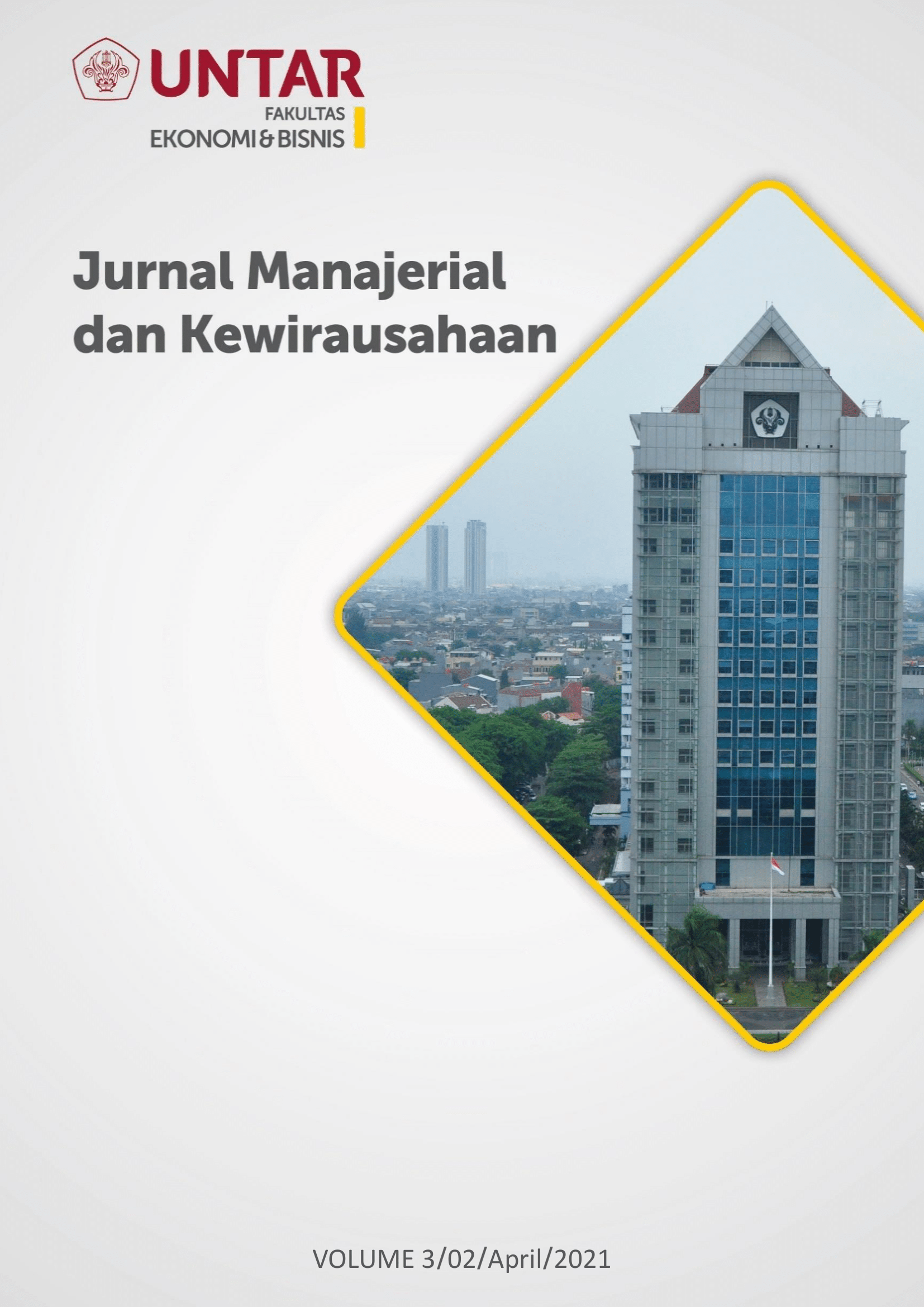Pengaruh Kolaborasi, Kecerdasan Budaya, Dan Orientasi Kewirausahaan Terhadap Kinerja Ukm Kota Sibolga
Main Article Content
Abstract
The purpose of this research is to determine the effect of collaboration, cultural intelligence, and entrepreneurial orientation on the performance of SMEs in the tourism support sector in Sibolga City, North Sumatra. The sample used in this research is as many as 40 respondents who are the owners of the SME business in supporting tourism with the sample selection technique, namely purposive sampling. This study uses data analysis with the Partial Least Square approach in the form of the SmartPLS version 3.0 application. The results in this study indicate that collaboration and cultural intelligence have a positive and significant effect, while entrepreneurial orientation has a positive but insignificant effect on the performance of SMEs.
Penelitian ini bertujuan untuk mengetahui pengaruh dari kolaborasi, kecerdasan budaya, dan orientasi kewirausahaan terhadap kinerja UKM bidang penunjang pariwisata di Kota Sibolga, Sumatera Utara. Sampel yang digunakan dalam penelitian ini adalah sebanyak 40 responden yang merupakan pemilik dari usaha UKM bidang penunjang pariwisata dengan teknik pemilihan sampel yaitu purposive sampling. Penelitian ini menggunakan analisis data dengan pendekatan Partial Least Square berupa aplikasi SmartPLS version 3.0. Hasil dalam penelitian ini menunjukkan kolaborasi dan kecerdasan budaya memiliki pengaruh yang positif dan signifikan, sedangkan orientasi kewirausahaan memiliki pengaruh yang positif namun tidak signifikan terhadap kinerja UKM.
Article Details
Section
This work is licensed under a Jurnal Muara Ilmu Ekonomi dan Bisnis Creative Commons Attribution-ShareAlike 4.0 International License.,/p>
References
Andiningtyas, imma., Ratna L Nugroho. (2014). Pengaruh Orientasi Kewirausahaan terhadap Kinerja Perusahaan Kecil. Vol. 14, No. 1.
Barney, J. B. (2001). Is the resource-based “view” a useful perspective for strategic management research? Yes. The Academy of Management Review, Vol. 26, No. 1, 41-56.
Becherer, Richard C. dan John G. Maurer, (1997). The Moderating Effect of Environmental Variables on the Entrepreneurial and Marketing Orientation Of Entrepreneur-led Firms. Entrepreneurship: Theory and Practice, 22 (1), 47-58.
Bouncken, R. B. and Kraus, S. (2013). Innovation in knowledge-intensive industries: the double-edged sword of coopetition. Journal of Business Research, Vol. 66, No. 10, 2060-2070.
Covin, J. G., & Slevin, D. P. (1991). A conceptual model of entrepreneurship as firm behavior. Entrepreneurship Theory and Practice, Fall, 7-25.
Dries, L. and Swinnen, J. F. (2010). The impact of inter-firm relationships on investment: evidence from the polish dairy sector. Food Policy, Vol. 35, No. 2, 121-129.
Hatta, I. H. (2015). Orientasi Pasar, Orientasi Kewirausahaan, Kapabilitas Pemasaran dan Kinerja Pemasaran. Jurnal Aplikasi Manajemen, 13 (4).
Indraha Talidziduhu. (2003). Teori Budaya Organisasi. Ed. 2. PT. Rineka Cipta. Jakarta.
Kadam, R., Rao, S., Kareem Abdul, W., & Jabeen, S. S. (2019). Impact of cultural intelligence on SME performance: The mediating effect of entrepreneurial orientation. Journal of Organizational Effectiveness, 6(3), 161–185.
Kang, K.N. and Park, H. (2012). Influence of government R&D support and inter firm collaborations on innovation in korean biotechnology SMEs. Technovation, Vol. 32, No. 1, 68-78.
Khilji, S.E., Davis, E.B. and Cseh, M. (2010). Building competitive advantage in a global environment: leadership and the mindset. in Devinney, T., Pedersen, T. and Tihanyi, L. (Eds), The Past, Present and Future of International Business and Management, Advances in International Management, Emerald, New York, NY, 353-373.
Kostopoulos, S., & Prastacos. (2007). The Resource-Based View Of The Firm And Innovation: Identification of Critical Linkages. Article of Management, 1- 13.
Lumpkin, G.T. and Dess, G.G. (1996). Clarifying the entrepreneurial orientation construct and linking it to performance. Academy of Management Review, Vol. 21, No. 1, 135-172.
Lorenzoni, G. and Lipparini, A. (1999). The leveraging of inter-firm relationships as a distinctive organizational capability: a longitudinal study. Strategic Management Journal, Vol. 20, No. 4, 317-338.
Malhotra, N. (2009). Marketing Research: An Applied Orientation. New Jersey: Pearson.
Ranatiwi, M., & Mulyana, M. (2018). Dampak Jejaring Kolaborasi Dan Kapabilitas Inovasi Terhadap Kinerja. Jurnal Ekonomi Dan Bisnis, 19(1), 49-58.
Suryaningsih. (2018). Kinerja UMKM Ditinjau Dari Orientasi Pasar, Orientasi Kewirausahaan Dan Inovasi, 1-13.
Wang, G., Dou, W., Zhu, W. and Zhou, N. (2015). The effects of firm capabilities on external collaboration and performance: the moderating role of market turbulence. Journal of Business Research, Vol. 68, No. 9, 1928-1936.
Wiklund, (1999). The Sustainability of the Entrepreneurial Orientation Performance Relationship, Entrepreneurship Theory and Practice. Baylor University.
Yvonne du Plessis. (2011). Cultural Intelligence as Managerial Competence. Diakses di http://repository.up.ac.za/handle/2263/18778.
Zulu-Chisanga, S., Chabala, M., & Mandawa-Bray, B. (2020). The Differential Effects of Government Support, Inter-firm Collaboration and Firm Resources on SME Performance in a Developing Ecomomy. Journal Of Entrepreneurship in Emerging Economies, 01-05.

